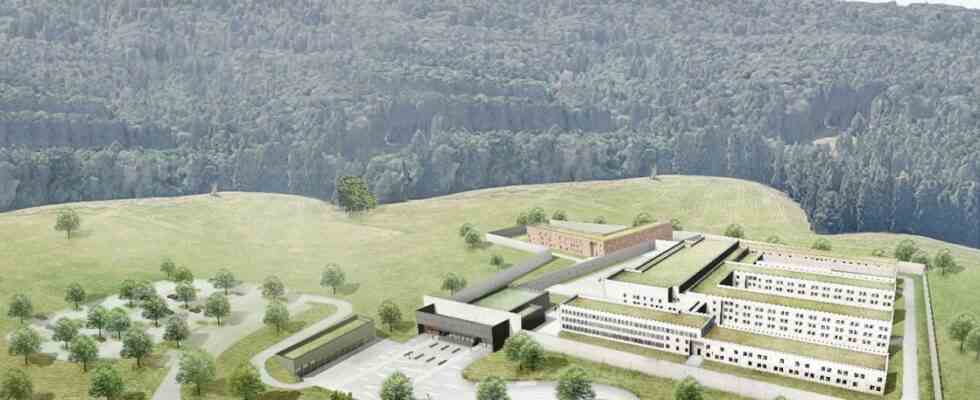An area of 70,000 square meters, an 800 meter long and six meter high prison wall, more than 300 employees and costs estimated at around 200 million euros: A huge prison with 450 places is being built in Passau. At least 100 of these are intended for people who are to be deported. The excavators have been rolling on Königschaldinger Strasse in the Heining district of Passau for a few months now, and the official laying of the foundation stone took place on Monday. For Prime Minister Markus Söder, Minister of Justice Georg Eisenreich and Minister of Building Christian Bernreiter (all CSU) reason enough to come to Lower Bavaria himself. For the Greens in the Passau city council, this is a “sign of the failed refugee policy in Bavaria,” as parliamentary group leader Stefanie Auer says.
The Bavarian Refugee Council is also critical of the mega-construction – and with some concern. “We have a new deportation prison in Hof with 140 places, in Erding and Eichstätt also with hundreds of places. Now another hundred in Passau – that’s completely disproportionate,” says spokesman Stephan Dünnwald. Authorities and courts are making excessive use of detention pending deportation. “50 percent of the cases are not legal.” Nevertheless, the existing deportation institutions, such as the largest in Bavaria to date in Hof, are not fully utilized, criticizes Auer from the Greens.
The refugee council fears that the new capacities will lead to even more deportations. “Because the seats should of course be filled.” From Dünnwald’s point of view, it is no coincidence that the large deportation centers are located in Hof and Passau. “Refugees who come across the border from the Czech Republic and Austria should then be taken directly into custody.” This prevents a thorough examination of the cases and good advice for the refugees, says Dünnwald. For example, whether a refugee has relatives or family in Germany, what the prospects of staying are, and to what extent a refugee is in danger at home. “The bigger the institution, the less the individual person plays a role.” The Bavarian State Office for Asylum and Repatriation is now booking its own charter flights for deportations. “A jail like the one in Passau helps, of course.”
Originally it was about regular inmates in prison. The new building had become necessary because the prison on Theresienstraße in downtown Passau is too small and no longer meets today’s standards. In the course of the refugee crisis in 2015, the Bavarian cabinet then decided to accommodate detainees awaiting deportation in the building in addition to prisoners – such a prison would be unique in Germany. Actually, prison and detention pending deportation must be strictly separated.
“I advise everyone to go there. It’s frighteningly impressive”
The state building authority in Passau calls the prison “combined institution”. What sounds practical and pragmatic like the famous GDR Mufuti, the multifunctional table, is a euphemism in the eyes of Dünnwald: “It’s an extremely difficult thing.” Synergy effects are probably expected from this, for example if staff can be deployed in both facilities or if medical care and food catering are regulated centrally. “But that would possibly eliminate the requirement for a clear separation. How do you always want to clearly separate criminal detention from administrative detention?”
Lawyer Auer has the same concerns. “I reject this construction, and it may not be legally correct either.” From the plans presented so far, it is not clear how the very different safety and accommodation standards are to be guaranteed. “Detainees awaiting deportation are not allowed to be kept in their rooms, they can use their mobile phones, and they don’t have barred windows. Families have to be housed together.”
The building authority says that there will be separate entrances, driveways and buildings for prison and detention pending deportation, separated by a wall also within the facility. “Prisoners awaiting deportation sit behind prison walls and inside they are separated by a wall. That’s how refugees are treated here in Bavaria,” says Auer.
Critics also see the handling of nature as endangered. “The use of land is gigantic. And that in a valuable local recreation area right next to the city,” says ÖDP City Councilor Urban Mangold. He is particularly annoyed that the area for the prison was later enlarged again. “Because of a huge parking lot.” An underground car park or a multi-storey car park had been rejected due to security concerns. “Which prisoner escapes into the multi-storey car park in the event of an escape?” In Mangold’s opinion, a prison near a freeway exit would have been better off.
The residents of Königschaldinger Straße will have to deal with construction noise and dirt until at least 2027. “The suffer,” says Green City Councilor Auer, who has already looked around there. “I advise everyone to go there. It’s frighteningly impressive.”

